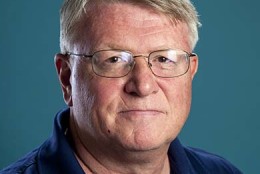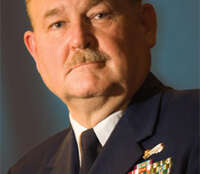Hubbard Radio Washington DC, LLC. All rights reserved. This website is not intended for users located within the European Economic Area.
On Air: Federal News Network
Defense
-
The nominee to be the new Army Chief of Staff -- General Mark Milley -- says he believes the troop cutting plans the Army finalized this month will leave a force that’s still capable of doing all it’s being asked to. But that capability also comes with a high level of risk -- including the risk of more casualties in combat. More from Federal News Radio’s DoD reporter Jared Serbu.
July 21, 2015 -
The recent false alarm at the Washington Navy Yard has insider threats on the minds of employees at military bases all over the country. The Defense Department has a long list of recommendations to protect itself better against insider threats. The Government Accountability Office issued 79 of them after the Fort Hood shooting in 2009. But DoD doesn't know how it's doing on those recommendations because individual military services aren't consistently communicating and reporting their progress. Joe Kirschbaum is the director of defense capabilities and management issues at the Government Accountability Office. He tells In Depth with Francis Rose about the force protection guidance DoD already has, and the recommendations GAO first made after the Fort Hood shooting.
July 20, 2015 -
The Army wants to upgrade its Bradley fighting vehicles with some new vision technology. Specifically, a camera that lets disembarking soldiers get a 360-degree view of the battlefield before they exit the vehicle. Maj. Stephen Tegge is a special project officer at the U.S. Army's Tank Automotive Research Development and Engineering Center. He joined Tom Temin on the Federal Drive with more on the project.
July 20, 2015 -
This weekend, the US and Australian militaries will wrap up a huge, biennial training exercise called Operation Talisman Sabre. It's been going on since July 4th, involving a fight between 30,000 Australian and US military personnel and a fictitious enemy. Lt. Gen. Stephen Lanza is the commander of the US Army's I Corps. In a phone interview from Australia, he tells In Depth guest host Jared Serbu that the exercise gave the military a chance to bring a whole-of-government approach to combat and stabilizaiton operations: something he says the Australians happen to be particularly good at.
July 17, 2015 -
With a nuclear deal kind of, sort of in place, Iran has been at the forefront of the news lately. But it would be a mistake to take the focus off other places on the radar screen. In particular, China. Peter Singer is a military expert and futurist at the New America Foundation. He joined Tom Temin on the Federal Drive to explain why he believes the Chinese threat is the primary one the United States faces.
July 17, 2015 -
The man who authorities say killed four Marines in an attack on a military recruiting center and another U.S. military site was a 24-year-old, Kuwait-born engineer who had not been on the radar of federal authorities until the bloodshed. Federal authorities are looking into the possibility it was an act of terrorism, but say there is no evidence yet that anyone else was involved, or that the public is in any danger.
July 17, 2015 -
The Army has known for a few years now its active duty end strength will have to get smaller. It's even announced the final number: 450,000. And sequestration — if it continues in fiscal 2016 — will make things worse, putting the Army on a path to an active duty force of 420,000. But the decisions on which bases those cuts will come from are now out, and many lawmakers are suddenly up in arms. Mark Cancian is a senior adviser for the International Security Program at the Center for Strategic and International Studies and former chief of the Force and Structure and Investment Division at the Office of Management and Budget. He tells In Depth guest host Jared Serbu the Army is taking the same approach to impending budget cuts as a private company might when its workforce gets too expensive.
July 15, 2015 -
Gen. Martin Dempsey releases a new National Military Strategy as one of the last major actions of his term as chairman of the Joint Chiefs of Staff. Dempsey said the strategy addresses the factors that are driving massive change in the military environment. Michael Vlahos is professor at the Johns Hopkins University Global Security Studies Program, and was recently a professor at the U.S. Naval War College. Retired U.S. Navy Capt. Jerry Hendrix is the director of the Defense Strategies and Assessments Program at the Center for a New American Security and former director of the Naval History and Heritage Command. They tell In Depth with Francis Rose about document's impact and Hendrix explains what makes it different from other strategy documents
July 15, 2015 -
We've known for several years that the Army was planning to reduce its active duty end strength from 490,000 soldiers to 450,000. Now we know exactly where those cuts will come from. While the Army says more than 30 bases will be impacted, some will be hit especially hard — Fort Benning, Georgia and Fort Hood, Texas will each lose more than 3,000 soldiers. Joint Base Elmendorf-Richardson in Alaska will lose 2,600. Retired Lt. Gen. Guy Swan is the vice president for education at the Association of the U.S. Army. He tells In Depth guest host Jared Serbu what the cuts mean for soldiers and military communities.
July 14, 2015 -
The U.S. Army wants to know how it compares to its allies and enemies so it can determine which of its fielded systems are performing comparatively well and what needs to get better. To conduct that analysis, leaders turned to the RAND corporation, which had the challenge of assessing the world's armies based entirely on open-source information — and distilling it all into a detailed, but unclassified report. John Gordon is a senior policy analyst at RAND, and one of the authors of that report: Comparing U.S. Army Systems with Foreign Counterparts. He tells In Depth guest host Jared Serbu, what the study found, and what the Army wants to get out of it.
July 14, 2015 -
Defense Secretary Ash Carter has ordered a six-month study aimed at formally ending one of the last gender- or sexuality-based barriers to military service, saying the Pentagon's current regulations banning transgender individuals from serving in the military need to be examined.
July 14, 2015 -
Geographic information systems and intelligence have been converging for a while now. Now nearly all forms of information are available in digital form. The challenge is integrating them. That discipline is called GEO-INT. Former Coast Guard Commandant Thad Allen is now an executive vice president at Booz Allen Hamilton. As a long-time user of both geographic information and intelligence, he joined Tom Temin on the Federal Drive how this data convergence is changing the intelligence landscape and even his own company.
July 10, 2015 -
When is a subcontractor not a subcontractor? Answer: When the prime is so dependent on the sub that, in effect, the sub really is the prime. But it's not always easy to tell. That's the gist of a recent case involving an Army services contract. In this week's Legal Loop, Joe Petrillo, a partner at the law firm Petrillo and Powell, joined the Federal Drive with Tom Temin with more.
July 09, 2015 -
The White House has vowed to destroy ISIS. Defense Secretary Ash Carter echoed that vow and recently unveiled a new military strategy designed to do just that. Carter testified before the House Armed Services Committee, and said U.S. forces will not let up until they've eliminated the terrorist army. Retired Lt. Gen. Dave Barno is a distinguished practitioner-in-residence at American University. He joined the Federal Drive with Tom Temin to assess Carter's strategy.
July 09, 2015















